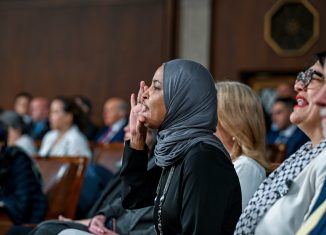Francis Suarez: Ron DeSantis Is Being Disloyal To Donald Trump By Running For President
2024 GOP Presidential Candidate Miami Mayor Francis Suarez spoke to Brian Kilmeade about getting closer to qualifying for the first Republican Presidential Debate in Milwaukee on August 23. Suarez has met the donor requirement of at least 40,000 unique donors and he believes he is closing in on the polling requirements. When asked if he believes the reason Ron DeSantis is falling in the polls is because Donald Trump is so strong, Suarez responded that he is in a freefall because loyalty is an important component of a campaign and believes it is clear that DeSantis decision to run for president shows he is disloyal to Donald Trump. Suarez said, “If the former president had done for me what he did for the governor, I wouldn’t run against him.” Suarez added, DeSantis was going to get crushed in the primary by Adam Putman until Trump rescued him. Suarez also discussed how he would handle the Ukraine, Russia war. Suarez says the first thing you have to do is get the parties to the table and try to negotiate a resolution as quickly as possible because people are dying and it is not a conflict that befits anyone. While Suarez is glad Saudi Arabia is stepping up trying to broker peace, he is worried China is taking a lead role because we should be the leaders of brokering peace in the world.
Listen here:
Rough transcript:
Brian Kilmeade [00:00:00] With us right now is Miami Mayor Francis Suarez, who is running for the GOP nomination, is on the cusp of qualifying for the August 23rd debate. Mr. Mayor, welcome. How close are you to qualifying for the 23rd?
Francis Suarez [00:00:15] Very close. We just reached and we announced the 40,000 donor threshold yesterday. And what’s left is one or two pools that we have to meet. I think we’re trying to establish with the RNC that we met the national poll and we need one more national poll and one more straightforward. We feel confident that over the next couple of weeks we’ll make it and be there and have an opportunity to tell my story and our story of American prosperity to a country which I think is is is important because most of the country doesn’t know me. I’m running against people who in some cases have been, you know, national figures for many, many years. And I think what’s exciting about my candidacy is who I am from a personality perspective, what we’ve accomplished in Miami and how we can create prosperity across the country. And my vision for the future of this country and how we tackle big problems like the ones you’ve just been focusing on right now, particularly the border. I’m going to the border tomorrow. I will be there. And we are not treating it like the national tragedy and the national crisis, that it is an issue where you want to declare a state of emergency, declared a state of emergency on the border where you have 300 people dying every single day of fentanyl overdoses in our country, that is the equivalent of a 747 crossing every single day. We have the cartels making more money selling human trafficking than they are now selling drugs and guns, which is, you know, unfathomable what they do with children. And, you know, it’s just it’s really grotesque. So we have these incredible threats. We have China buying property in our country, you know, putting spy balloons over our territory, you know, spy base in Cuba, becoming a training base, putting fentanyl through our southern border. And they’re doing everything to disrupt our country. And at the same time as they distract us and they put a stranglehold on all these countries that they’re lending money to in exchange for the possibility of putting a military base there in the future. They are graduating more PhDs in computer science. They have better 5G than we do. They’re focusing on quantum computing to break our codes and read our emails. I mean, this is really dangerous stuff.
Brian Kilmeade [00:02:29] I hear you, Mr. Mayor. Let’s go back to the border for a second. Mayor Eric Adams came out and said, hey, it’s up to you to do something. We have 62,000 illegals in New York City. Get your head around that for a second. 62,000. We’re getting 10,000 a week here. And his buddy Joe Biden’s not giving a dime. He asked for 300 million. We got about 100 million. But it’s not going to do anything. They’re taking over soccer fields and making tent city so the kids have nowhere to play, taking over parks. And Mayor Eric Adams says, well, what are you doing about it? Why is it just Eric’s problem? Is that the right leadership?
Francis Suarez [00:03:04] Yeah. You know, in Miami, we had 14,000 new kids in our public school system last year. That’s the equivalent of seven new 2000 students schools. We have to get the border under control for a variety of reasons. We have Chinese that are coming through the border, penetrating our country to spy on us. We have just an incredible amount of illegal immigration which is burdening all of our cities. Oh, by the way, like you said, this is a this is not a Republican or Democrat thing. You’ve got you just cited two examples of two Democrats who are, you know, who are pleading for help and who realize that this is out of control. Right. And we’re never going to solve immigration in the long run if we can’t control our border. That is. I mean, you talk to anyone, Republican or Democrat, and I’ll tell you, that is the first thing that you have to do is control the border and then. Right. You can focus on solving immigration, illegal immigration, in a way that benefits this country in the long term. And that’s what we have to do.
Brian Kilmeade [00:04:03] You know, it’s interesting. It’s bleeding into blue states because you’ve got the governor of Massachusetts say it’s out of control, the mayor of New York and the governor of New York state and out of control. You have blue cities and states in about 15 in Congress, Democrats. What is it going to take for this president? You’re you’re Hispanic-American, you’re Cuban-American. There is a conventional wisdom out there. And I think it’s wrong that if you start talking bad about the border and cracking down, it’s a message that we don’t like Hispanics as a country. Is that how you internalize it?
Francis Suarez [00:04:32] No, it’s completely wrong. And I go step further. Hispanics are up for grabs in this election in 2024. The last poll that I saw showed that 20% of Hispanics are undecided. Now, let me put that number in context. There are 60 million Hispanics in the United States. Right. So if you if you take 20% of that, that’s 12 million. And the last two presidential elections have been decided by less than 100,000 votes. So think about that. There’s 12 million people and they don’t they’re not all registered to vote. So there’s a percentage of that that are available that are undecided. And I think part of the reason why I’m running is because I believe as a candidate that I can appeal to that segment. I can connect with that segment. I understand the nuances of that segment. I’m not going to do what the Democrats have done or I don’t know who the branding expert is, but whoever that is, they need to fire them right where they call, you know, Hispanics like necks. And let me say, they’re as unique as San Antonio Tacos or, you know, this this beautiful economic principle called biodynamics, which I’ve never heard of. Apparently, they want to extoll the virtues of an economic philosophy where the poor get poorer through rising inflation and rising interest rates. I mean, it’s just stuff that doesn’t make any sense whatsoever. And that’s not how you’re going to connect and influence a large segment of our country, which is pro-family, pro-law enforcement, pro following the law, pro small business. Right. They they they start with nothing. And oftentimes, which is the great thing about this country generate tremendous amount of work in one generation right.
Brian Kilmeade [00:06:05] From the southwest quarter. By the way, it’s not just Hispanics, 5.7 million encounters since Joe Biden took office and now record highs on the northern border. But now in Florida, Ron DeSantis looks as though he’s he has just changed again, his his campaign director. What do you think about his campaign so far, do you think? Do you think that he has not moved up because of him or because Trump is so strong?
Francis Suarez [00:06:34] No, I think he’s in a bit of a freefall because, you know, when you get to the when you get to the national level, there’s very little in terms of policy that distinguish talk as Republicans. So what happens is voters then start to focus on personality, right? Because they say, okay, well, you feel the same way about the border. We all feel the same way about shrinking government. We all feel the same way about, you know, how we need to confront China and the war in Ukraine and all these things. But what the difference is, how do we project? How do we connect? You know, is this the kind of person that I can see being our president for the next four years? By the way, loyalty is an important component. Relationship building is an important component because how do you create relationships with foreign dignitaries? How do you deconflict, you know, conflicts in the world if you’re not a person that’s considered to be loyal? If you’re not a person that’s considered to be able to build relationships. That’s something that I’ve done. I was blessed to be elected by 80%.
Brian Kilmeade [00:07:34] So you don’t believe that You believe by him running against Donald Trump, he’s being disloyal?
Francis Suarez [00:07:41] Well, I think that it’s clear that, you know, somewhat I mean, look, if if if the former president had done for me what he did for the governor, I wouldn’t run against him. I mean, he was an obscure primary candidate, which, by the way, I gave money to him in the primary and he was running against a guy that was well-funded and well-known. You know, Adam Putnam. And he was 30% or something like that. He was going to get crushed and the former president basically rescued him, made him you know, and I think that’s part of of loyalty, Right. I mean, the political loyalty is important. I believe it is. And I also think building relationships when you’ve lost, I think of the 13 congressional congressmen and women who, by the way, were his colleagues when he was in Congress that have endorsed 12 of them, have endorsed the former president. Only one who worked for him have endorsed him. So I think there’s a relationship issue now.
Brian Kilmeade [00:08:35] But, Mr. Mayor, they didn’t endorse. But they didn’t endorse you either.
Francis Suarez [00:08:39] I don’t know. They’re they’re not they were my former colleagues. You know, they’re not my friends. Right. So they’re choosing between two people that they know intimately. Right. I don’t know them. I didn’t serve with them. I promise you that if I knew them and I served with them, I would have gotten my fair share of those of those elected officials. I can promise you that.
Brian Kilmeade [00:08:58] So the governor, DeSantis, has suspended state attorney Monique Warrell for neglect of duty. Warrell is the ninth Judicial Circuit for a judge there, neglecting your duty and not faithfully prosecuting crime in the jurisdiction. Where else, practices and policies have too often allowed violent criminals to escape full consequences of their criminal conduct. Your reaction to this? Do you know or is this a move that you would support?
Francis Suarez [00:09:27] I don’t know her, but I support the move. I was listening to Ashley Moody, who’s the attorney general this morning at the press conference. I like Ashley a lot. We went to law school together and I supported her when she ran for office. And she was explaining how this particular prosecutor has not prosecuted 40% of violent crime, 40%. So it basically means you commit a violent crime in that jurisdiction, and there’s a almost 50% chance that you’re not even going to be prosecuted. That is not upholding the law. That is not upholding your sworn duty as a prosecutor. And it makes people less safe. You know, the law is meant in part when you break it as a punishment, as a deterrent. And also, you know, people who have broken the law, they need to to pay that price. And and if they’ve done a violent crime, obviously spent time in jail. And obviously what happened there is you hope that they reform, but at the very minimum, they’re not out on the streets the same day or 24 hours later, 48 hours later, committing the same kind of crime. That lawlessness is what we’re seeing in cities across America and that lawlessness. Look, in Miami, we don’t tolerate that. And by the way, I don’t know if you saw the press conference, but she used Miami Dade as an example of a jurisdiction that is significantly better than the one that she was being suspended in. And, you know, in Miami, we right now have the lowest homicide rate in the city of Miami since 1964, last year per cop. This year, we’re 37% below that number. When you compare that to Chicago, that led the nation to 11 straight years with 700 homicides. We have 17 right now here today. So you know where we are as a city. I’m proud as its mayor to focus on promoting law enforcement. I hear.
Brian Kilmeade [00:11:23] You also. You do support with the governor’s done. He’s taken bold action there. So I got to tell say, Mr. Mayor, we’re in a stalemate in Ukraine. And there’s a sentiment among many Republicans, especially that they’re tired of writing checks to Ukraine. What do you what is your view on that conflict and how much what does it mean in Mayor Suarez’s view for national security?
Francis Suarez [00:11:44] Yeah, look, it’s actually worse than that. I’ve seen polls that say that Americans generally, not just Republicans, are tired of continuing to write checks. I think there’s been very little accountability and I think that there’s been a loss of trust. I think the other part is when you take a step back and you look at the president’s lack of projection of strength in his foreign policy, we wouldn’t have gotten in this situation in the first place. I think he’s talked about this in the intro where you talked about the incompetent withdrawal from Afghanistan. Right. When you when you when you withdraw in an incompetent fashion, the signal that you’re sending to your enemies or to your adversaries is advanced. You should be aggressive.
Brian Kilmeade [00:12:25] He said that. But if this is dropped in your lap, Mr. Mayor, what do you do as president?
Francis Suarez [00:12:30] I think the first thing you have to do as president is you have to get the parties to the table to try to negotiate a resolution as quickly as possible. People are dying. This is not a conflict that benefits anyone. There is a possibility of nuclear war in the future. And I’m glad that that Saudi is doing that is stepping up. Obviously, China has tried to do that. We don’t want China to be the broker of peace in the world. We should be to broker peace. And the hope is that that as a U.S. president, you’re able to make that happen. It’s very difficult.
Brian Kilmeade [00:12:59] It is. But, Mr. Mayor, have you had Russia take 20% of any country? And talk peace. They won. It’s a tough one. Mayor Suarez, best of luck. Absolutely doubt. Hopefully by the end of the week, you’ll have some news that you’re on the debate stage, because I’d love to see it.
Francis Suarez [00:13:13] I love to see it, too. Thanks.
Brian Kilmeade [00:13:15] Miami Mayor Francis Suarez. Go get him.






